The recent statements by former US Vice President Joe Biden on the alleged Russian influence in Italian constitutional referendum of December 2016 have made the issue of Russian propaganda in Italy once again relevant. The elections will take place in a month and the polls for the moment see the center right solidly in the lead. In addition, the discourse seems to be dominated by the “populist” tones of the 5 Star Movement and the Northern League, giving rise to fears expressed by many that Putin’s Russia is preparing to falsify the Italian vote by exploiting an aggressive form of propaganda, as happened in America, where according to many experts, a man like Donald Trump could never have been elected president if not it was for Putin.
Not just disinformation
But in addition to the disinformation campaign led by the Kremlin to manipulate Western electorates, some other experts speak of an even more worrying phenomenon, an intrinsic pro-Russian bias among Italian media, as if to say that the Kremlin and the Russian secret services were not only spreading propaganda through social media and their direct channels like Russia Today and Sputnik. The pro-Russian bias of Italian media would be an indicator of the fact that most likely the Kremlin corrupts large Italian media directly, spreading falsehoods through state and private media alike, using loads of cash to corrupt less than pure characters. Precisely to combat these falsehoods and to counteract the evil influence of Russian propaganda in general, the StokFake project, born in Ukraine with the Maidan revolution, has been running for many years a page in Italian, dedicated to debunking fake news in Italian media, but not only, as we shall later see.
Is Italian media really pro-Russian?
Platforms such as Stopfake, to which some of the most vocal Italian personalities involved in the Ukrainian conflict contribute, seem to constantly allude to the fact that Italian journalism is dominated by idiots with intellectual abilities bordering on pathological cretinism, mostly amorous and corrupt characters who sold their souls off to dictator Putin. “The overwhelming majority of Italian media are under the control of the Russian lobbies and so the Kremlin propaganda is widely represented on the pages of newspapers and on television screens,” Mauro Voerzio (click here to see Voerzio magistrally exposing Russian propaganda in Italy) had already said more than a year ago, surely one of most active and present Italian characters in the representation of the Ukrainian crisis.
Certainly in these tense times it is necessary to be always on the alert, but in general, for those who watch TV and read Italian newspapers with sobriety and critical eye, the impression is that the Russian ascendant, if present, is definitely limited. But to make some clarity we decided to undertake a brief analysis of the archives of the news concerning Russia and also the Ukrainian conflict, as reported by the Italian media.
Our analysis
So let’s start our analysis from TV, because TV remains the preferred means of information for the Italian public. We start from the public service, often subject to attacks for its supposed servility towards the Kremlin.
Rai News
A simple search with the word “Russia” from today these results.
Leaving out the less relevant articles, such as those concerning the coming football world cup, on the first page of the results we find recent stories such as:
Brexit, Russian accounts on Twitter to support the Leave campaign
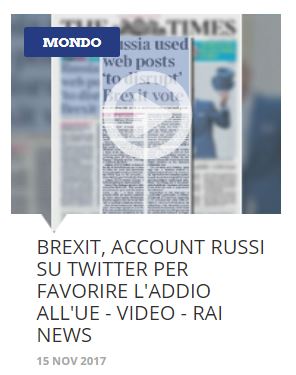
Or
Julija Laty’nina, the uncomfortable journalist who wants to leave Russia
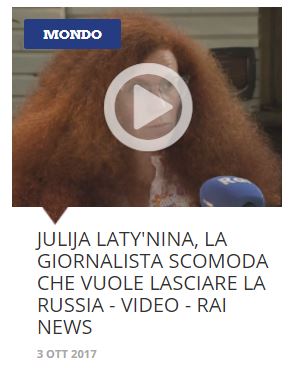
Can we talk about pro-Russian articles? The general tone seems to be the one we are very familiar with and one to which people who read the European press and observes other European and Western media in general is accustomed, and that hardly looks a friendly tone towards Russia.
Let’s see what results from the research with the word “Putin”.
Here too we take some results from the first page of the search results as of today, 1 February 2018.
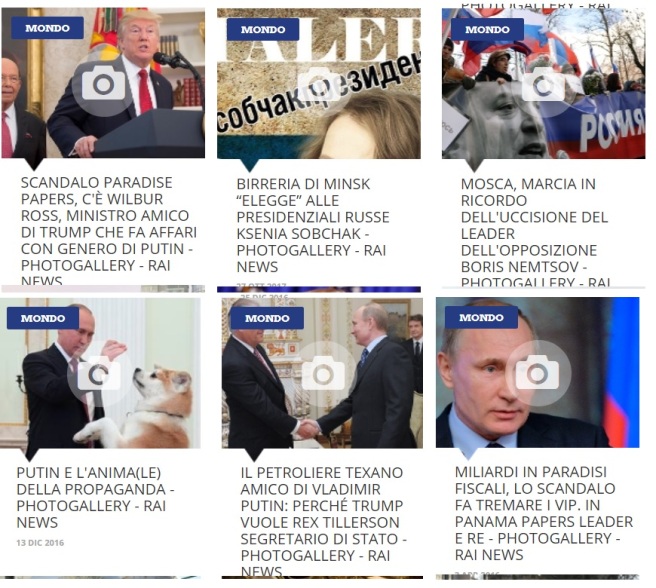
With stories on the Panama Papers scandal (where, among other things, the name of Putin did not appear), the new American Secretary of State called his “friend” and dogs used for propaganda purposes, it does not seem that Putin is a favorite of RAI.
Let’s see what results we get with the word “Ukraine”.
In selecting the most significant results we find:
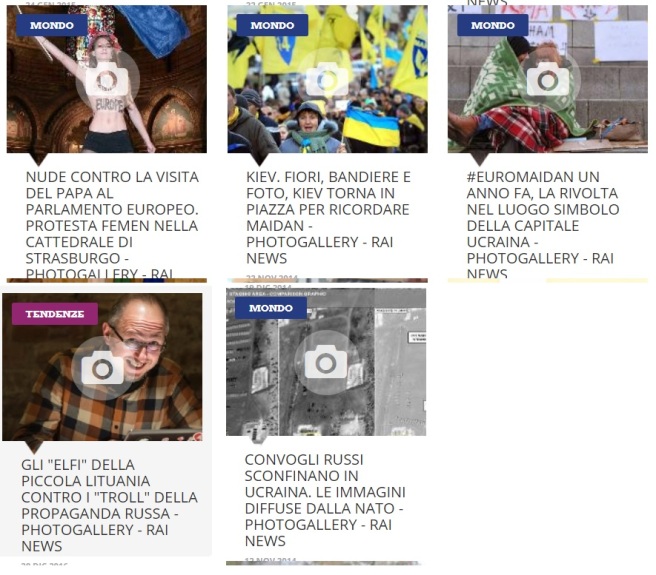
One can hardly speak of pro-Russian tones by reading these titles.
Let’s now have a look at private TV
TG.com
Here is a selection of the results obtained with the search for the word Russia on the site of TG.com, which belongs to the Mediaset groups.
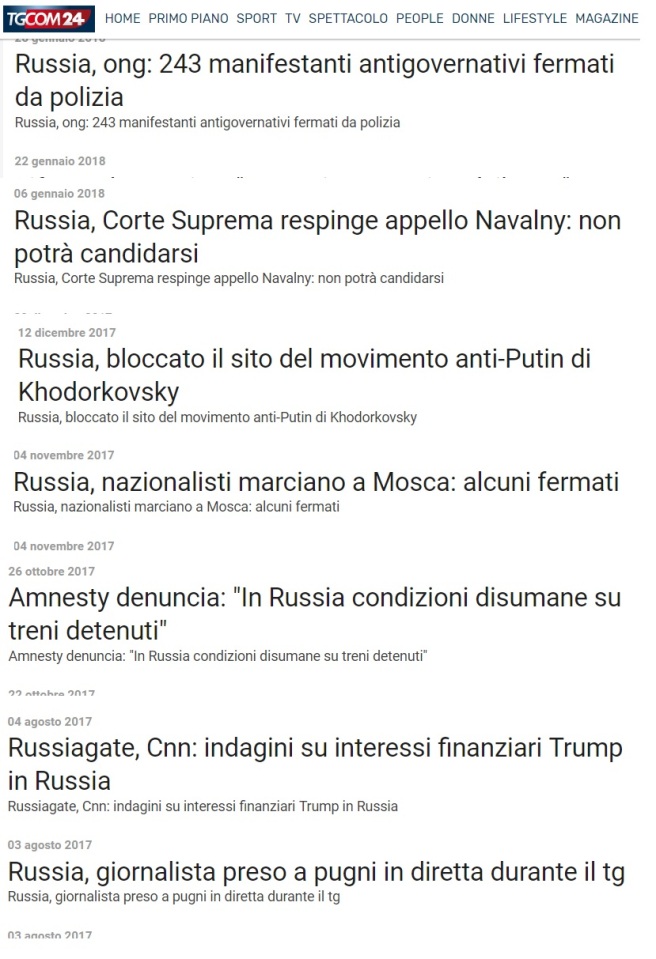
Russia does not look very well, with stories on Russiagate, Navalny and journalists punching each other on live tv. Speaking of Mediaset, not we can not fail to mention the famous Matrix service, which caused such a stir, about the Georgian snipers involved in the February 20, 2014 massacre on Kiev’s Maidan. The Italian friends of Ukraine were outraged about this report and denounced the Kremlin propaganda being seen on one of the most popular Italian tv channels. Even admitting that this particular report may have a pro-Russian bias, the proportion of pro-Russian stories and those with decidedly more critical tones towards Russia seems overwhelmingly in favour of the latter.
We now pass to the press, starting with the
Corriere della Sera
Russian disinformation, a problem not to be ignored, titles the Corriere on January 20, an article written by Maurizio Caprara, not just any young reporter trying to make his name. It is a story based on the worried warnings of a Latvian populist party member and in large part dedicated to the well-known EU vs Disinformation media project, organized by the EU and NATO to find the Kremlin propaganda wherever it can be hidden. “The indifference with which our country has treated, or rather ignored, a debate of the European Parliament on the false or distorted news released by Russia is appalling”. In short, there is no joke. “Quality journalism must be supported by governments and the EU. Otherwise it will disappear and will leave everyone at the mercy of the Kremlin or other trolls who have learned how to play the game of social media”, says the Latvian MP, cited by il Corriere. Quality journalism must be supported by governments? By the EU? Wasn’t journalism by definition meant to be indepedent of governments, the Fourth Estate? What happened to that?
Other recent stories taken from the Corriere
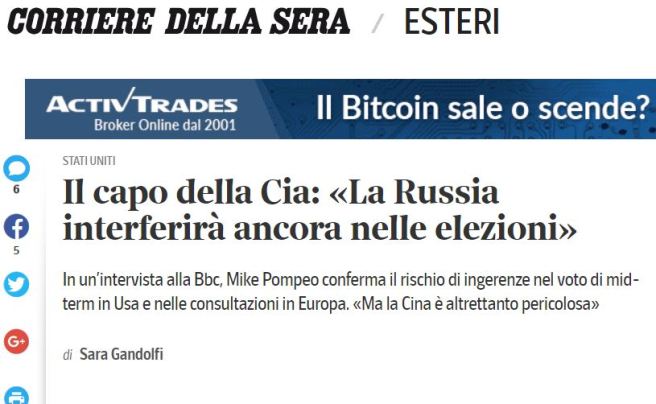
Elections 2018, the US report: “Russia ready to interfere”. Under accusation 5-star movement and Lega
And here an article by the correspondent of the US Corriere Massimo Gaggi “Russiagate can be worse than Watergate”.
Is il Corriere della Sera Pro-Russian? The answer seems to be a clear no.
La Repubblica
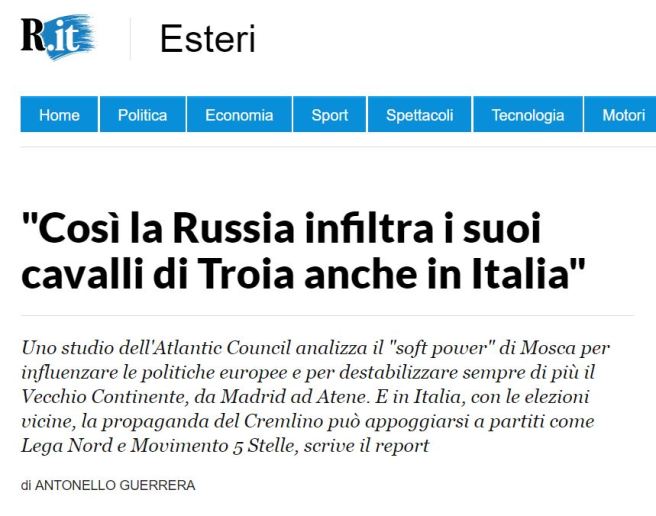
An article so pro-Russian that the text is reproduced the day after by StopFake. This is an abstract from the the text which deserves to be quoted in full because the strength of its condamning language:
“Russia has long had a new approach to achieve its political and military objectives through indirect and asymmetric methods, or rather active measures, as the actions in the Soviet Union were called to manipulate the media, society and foreign policy. According to the Atlantic Council, the Kremlin’s strategy is now explicit and very dense, not only in Eastern European countries historically influenced by Russia but also throughout the West, from the United States to the Europe: Moscow exploits European and American internal weaknesses and fractures by infiltrating institutions, politics, the democratic pillars of the West to promote its vision of the world and to pursue its economic objectives. It does not invest abroad like China, but aims at sowing cheap chaos […] Italy is at great risk. The Russian influence has grown in tandem with the economic crisis and the anti-establishment of society, and Putin has become a very powerful symbol of the new sovereignism and of the struggle against the elite. Russia has many potential political allies in our country, a large area that includes the Northern League, the 5 Star Movement, the Brothers of Italy, the far-right party Forza Nuova and some small extreme leftist groups. All share most of Putin’s foreign policy and support – voluntarily or not – the geopolitical interests of Moscow”.
L’Espresso
L’Espresso runs a big story on Russian hackers and trolls, ubiquitous and ready to exert their maling influence on the Italian public.
http://espresso.repubblica.it/internazionale/2017/01/05/news/ascolta-parla-putin-1.292587
Il Fatto Quotidiano
Often considered to be one of the the most illustrious examples of Russian propaganda in Italy, because Giulietto Chiesa runs a blog on its page. An archival research among the most recent news items does not seem to confirm this evalutation. It is indeed very easy to find articles of this kind.
La Stampa
Beware of Russian culture, warns the Turin newspaper La Stampa in the interview with Michael Carpenter, deputy secretary of state in charge of Russia, an interview published on December 9th 2017. “Moscow has interfered with the Italian constitutional referendum of 2016, is interfering with the campaign for the upcoming elections, and the US has the evidence, Michael Carpenter confirms to «La Stampa», former deputy assistant secretary of defense for Russia, Ukraine, Eurasia and Balkans”.
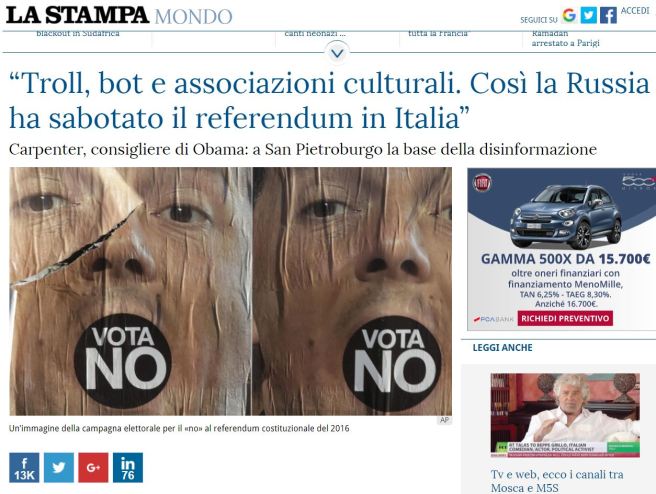
There is no trace of doubt: “Moscow has interfered”, “the US has evidence”, “confirms it”, an unequivocal language that leaves no room for misunderstanding. After all if the former US deputy secretary of state says it, an American, hey, not just some foreign minister, well, then it would certainly be foolish to question even for a second the facts exposed and revealed by a figure like that. It is certainly not part of the journalist’s job to question the authorities, the real authoritative authorities, like the Americans.
Il Giornale
Il Giornale belongs to the Berlusconi’s family = Putin and Berlusconi are friends = Il Giornale is Russian propaganda, the argument goes. A sample of the most recent and most significant stories on Russia that we found on il Giornale, however makes it very clear tha it would take a very good dose of fervent imagination to see Russian propaganda in Il Giornale.
Il Foglio
also repeats the warning from the former American vice president, as if it was a proven fact

East Journal
Experts journal that focuses on Eastern Europe. These are the results from a research in the website archive using the word Russia:
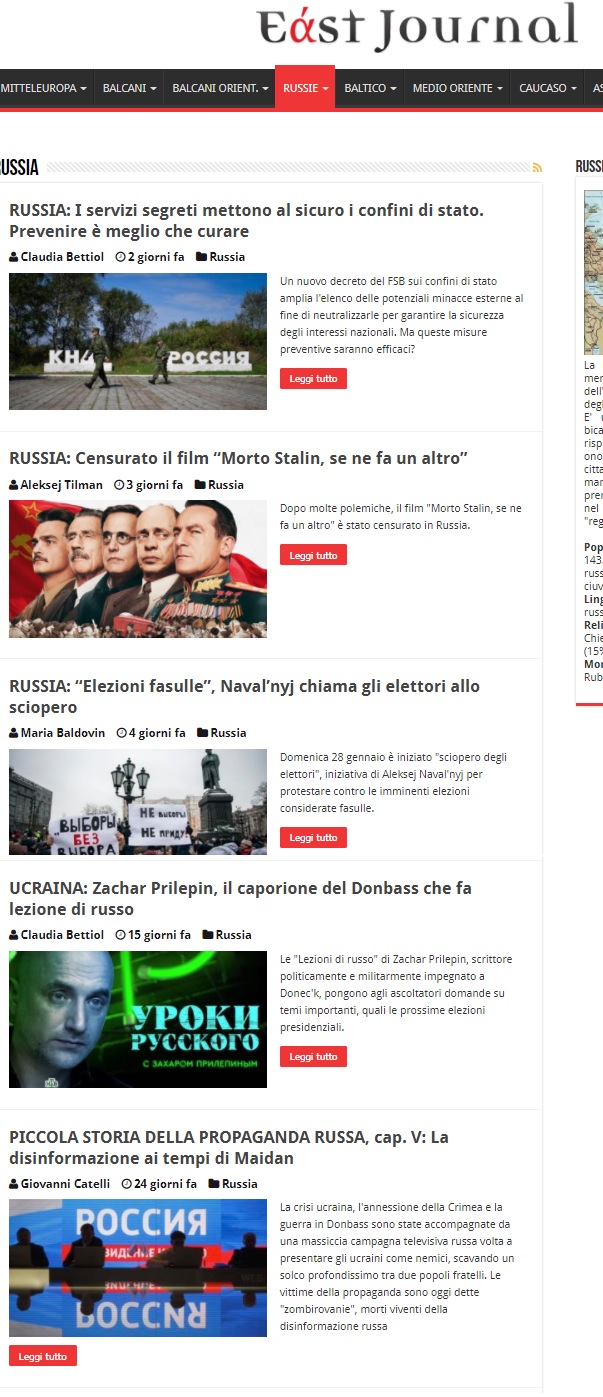
Also in this case the headlines speak for themselves “Russian propaganda”, “Prilepin – the ringleader” ans so on … Who said that experts journals need to be boring? You have to understand however, that writing about Russia, even for experts, especially for experts, one is tempted to say, and even more so for Italian experts, is indeed a precise literary genre, with stylistic rules well established for decades. After all for obvious reasons Russia, for the Italian man, grown up between sun, sea and beaches, drinking wine and tasting fresh fruits and fish, can never be a hospitable land and it is natural that the well-fed and let’s admit it, a bit pampered Italian mamma’s boy associates Russia with images from infernal anti-utopia. And in our times even the horror or dark novel genre has become an entirely respectable literary genre, which suits very well the movie industry too, and if people like it, then what’s wrong with it?
With me or against me
The allusion on which the theory of the immense influence of Russian propaganda in Italy and of the Russian control over the Italian media (and even some parties, such as M5S and Lega Nord) is based, without many efforts to hide it one has to say, seems to be that is not very original and certainly very typically notions held by many Italians that most Italians are a people of idiots and goats (with the exception, of course, of one’s own excellent and distinguished person), who are easily duped by those who at best are retrograde barbarians (and as we know, we can not resist progress), at worst, malicious attempts at misinformation and misrepresentation of reality.
However, the conclusion we come to after our analysis of a fairly varied spectrum of the Italian media landscape is that the famed Russian interference in Italian journalism is truly laughable. The tones of the Italian press with regards to Russia recall in all respects the tone of all the other Western media, be it German, French or British. The fact that here and there can be found materials that can appear even minimally critical of the Western position with respect to Russia or about the Ukrainian conflict can be interpreted as pro-Russian signals, pro Kremlin and pro Putin only if one is moved by ideological fanaticism, particularly dangerous when one is involved in a conflict to which one does not belong and of which one understands so little. Only the fanatics can interpret every allusion to criticism, every hint of dissent, as betrayal and corruption. “With me or against me,” said the Christ, but it is prerogative of the Christ to speak like that, not of ordinary mortals. In conclusion, the assessmentthat the Italian media is pro-Russian, much loved by fighters against fake news, does not pass the test of experimental verification and is in itself, fake news.
PS This analysis did not convince you? Well, then probably the solid arguments proposed by the greatest Russian propaganda expert in Italy in this conference, exposed in the most gifted oratorical skills, will not fail to convince you. Or will they?



One thought on “Is Italian media pro-Russian?”